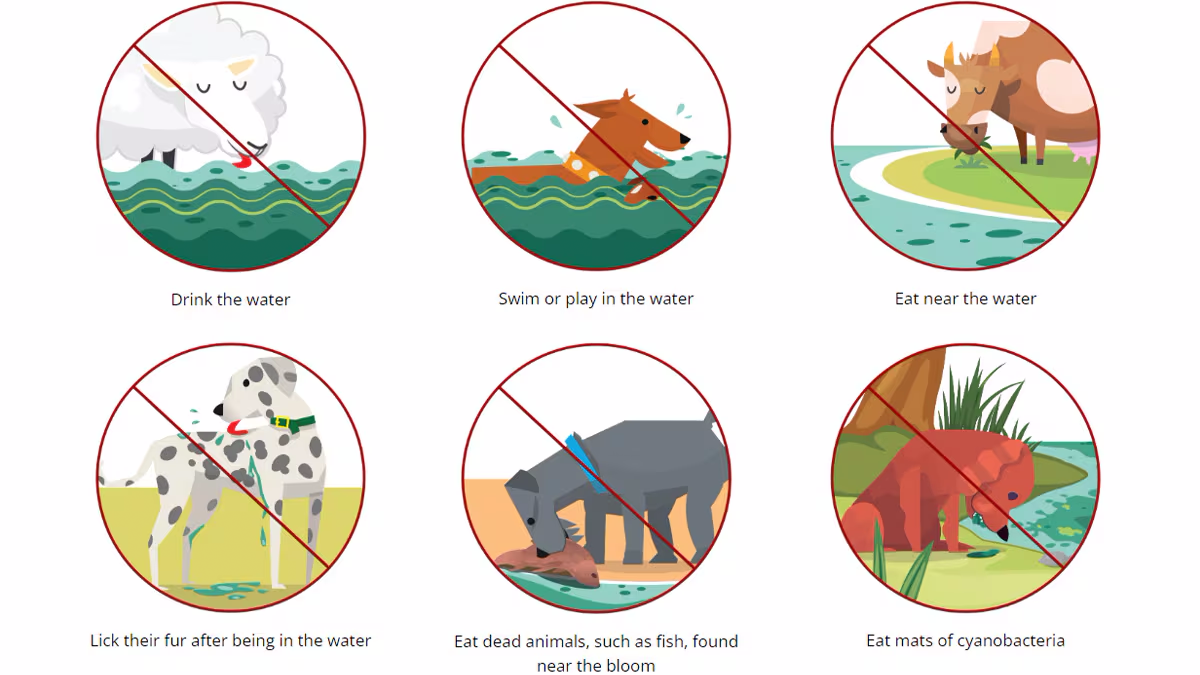Protecting your Pets from CyanoHABs
Blooms of CyanoHABs can pose a threat to pets and livestock while swimming, drinking and even inhaling or eating if the toxins from that bloom are present. It's crucial for pet owners and farmers alike to be aware of the risks associated with CyanoHABs and take necessary precautions to avoid their animal's exposure.
How are pets harmed?
When livestock and pets consume cyanoHAB contaminated water or food, they can get very sick and die in the span of hours to days. The toxins produced by cyanoHABs, called cyanotoxins, can enter the animal's body through the intestinal tract, affecting the liver, brain, and other tissues. Additionally, skin contact and inhalation of cyanotoxins can cause skin and nasal irritation, as well as exacerbate any breathing issues like asthma. Some dog deaths have even been linked to post swim fur licking as the route for ingestion of cyanotoxins.
How to prevent pet exposure?
The toxins from cyanHABs can be in contaminated waters but also in the cells themselves nearby the waters edge. If there is a cyanoHAB bloom in a water body near you, prevent your pet or animal from getting sick by not letting them interact with the water or anything along the water's edge. This can include any of the following:

What to do after an exposure?
If you realize after the fact that your pet may have been exposed to cyanobacteria by going near or in contaminated waters, be sure to wash them immediately with clean water and prevent them from licking their fur. Wear gloves to protect yourself from exposure.
After the initial exposure, monitor them carefully for any signs of sickness or irregular behaviors and if you have any concerns or notice anything abnormal CALL A VETERINARIAN. Some of these signs may include loss of energy or appetite, vomiting, unexpected falling, diarrhea, tremors, convulsions and even seizures.
Emergency Veterinary Services for Cape Cod and the Islands
Cape Cod (and beyond) Urgent Care and Emergency Service Veterinarians:
- Bourne: Cape Cod Veterinary Specialists (open 24/7)
- Dennis: Cape Cod Veterinary Specialists Dennis
- Plymouth: Veterinary Urgent Care Plymouth
- Weymouth: VCA South Shore Weymouth Animal Hospital (open 24/7)
- Braintree: Veterinary Urgent Care Braintree
Veterinarians available for Emergency Visits during working hours:
- Brewster: Brewster Veterinary Hospital
- East Falmouth: South Cape Veterinary Clinic, Falmouth Animal Hospital
- Eastham: Eastham Veterinary Hospital
- East Harwich: VCA Pleasant Bay Animal Hospital
- Falmouth: Deer Run Veterinary Services & Vista Veterinary Hospital
- Forestdale: Forestdale Veterinary Clinic -Veterinary Associates of Cape Cod
- Hyannis: Barnstable Animal Hospital
- Mashpee: Leach Animal Hospital
- Orleans: Animal Hospital of Orleans
- Osterville: VCA Osterville Veterinary Clinic
- Provincetown: Herring Cove Animal Hospital & Veterinary Wellness Center of Provincetown
- Sandwich: Oceanside Animal Hospital & Shawme Animal Hospital
- South Yarmouth: Veterinary Associates of Cape Cod
- West Barnstable: Cape Cod Animal Hospital
- West Yarmouth: VCA Hyannis Animal Hospital
Martha's Vineyard
Emergency veterinary services are provided on a daily rotating basis on Martha's Vineyard. Contact the sites below to be referred to the daily Emergency Veterinary Care provider.
Nantucket
Fact Sheets
